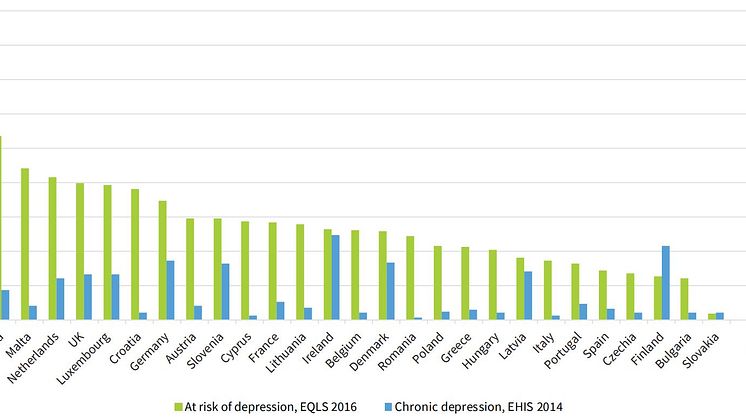
News -
Crisis point: Well-being of young people still defined by the economic crisis
Across the EU, 14% of young adults are at risk of depression, and 4% of young people aged 15-24 suffer from chronic depression. Young women are more likely to find themselves not in employment, education or training, and are significantly more likely to suffer depressive symptoms than young men. Child and youth homelessness have increased dramatically in several Member States over the past decade, and almost three out of ten children in the EU were at risk of poverty in 2016. Despite these difficulties, Eurofound’s research shows that a significant proportion of young people in Europe struggle to access vital health and public services.
Eurofound’s latest report uses both European Quality of Life Survey (EQLS) data, and existing data from national and European level to analyse the social and health situation of young people across the EU. It also applies new calculations and analysis to existing research to focus in on the situation of young people. The report was compiled in the context of the decline of Europe’s youth – the EU population aged 12-24 declined by 10 million between 2011 and 2016 – and the rising demographic challenges posed by Europe’s ageing population.
The report highlights widespread feelings of marginalisation among young people in Europe due to the economic crisis. Presenting in-depth case studies of support services in five Member States, it notes the significant spike in child and youth homelessness in several countries since the crisis – including in economically advanced Member States typically characterised by welfare states and higher levels of social spending. For example, in Sweden there was a 60% increase in children in emergency accommodation between 2011 and 2017, in the Netherlands there was a 60% increase in the number of children classified as homeless between 2013 and 2018; and in Ireland, France and Denmark around one in three registered homeless are children.
The issue of youth mental health receives particular focus in the report. There are high at risk of depression rates among young adults in several Member States, notably Sweden (41% at risk), Estonia (27%) and Malta (22%) – the EU average is 14%. The report also emphasises that gender is an important factor in depression: young women were more likely to suffer from depressive symptoms in most Member States, with significant gender gaps recorded in Denmark, Germany, Ireland and Sweden.
Risk of depression (18-24 years, 2016) and reported chronic depression (15-24 years, 2014), by country (%)

Sweden, Estonia and Malta record the highest at risk of depression rates among young adults in the EU. ‘At risk of depression’ is based on WHO-5 index of self-reported well-being over the past two weeks.
Despite these clear challenges young people face financial, cultural and societal barriers in accessing services. There is also the question of the adequacy of services in dealing with demand. With regards to accessing health services, there is evidence that, in addition to dealing with perceived stigma and confidentiality issues, young people also struggle with the affordability of services. Eurofound data shows that 20% of young people cite cost as being prohibitive in the EU; this climbs to 72% in Cyprus, 61% in Malta and 56% in Greece. Young adults in Greece were also the most likely to indicate cost as being prohibitive in accessing psychological or psychiatric services.
The report offers several policy pointers, including explicitly mainstreaming youth in the European Pillar of Social Rights and related initiatives, and supporting the provision of more youth-specific comparative data on access to social and health services. Young people are, comparatively, a dwindling demographic in Europe and many are not getting the support they need. It is often said that youth are the future, but they are also the present, and it is imperative to deliver adequate and responsive services for and with young people.
- Download the report: Inequalities in the access of young people to information and support services
- More information: European Quality of Life Survey 2016
- For further information on this story, please contact James Higgins.

